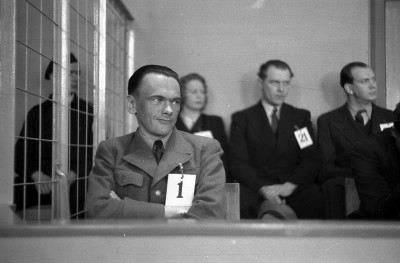National archives containing court files from Norway’s postwar trials into Nazi compliance are about to be opened, after having been sealed for 70 years. Information on why thousands of Norwegians were convicted and punished for cooperating with Nazi German occupiers during World War II will be publicly available from January 1.

The archives comprise 1,200 meters of shelf space in the National Archives (Riksarkivet) at Sognsvann in Oslo. They contain files from the court trials against alleged war traitors that were held in the late 1940s.
“These are the files for all those who were under investigation for treason after the war,” Erland Pettersen, deputy director of the National Archives, told Norwegian Broadcasting (NRK). “That means there are files regarding the individual fates of around 92,000 people lying here.”
Several of the files in what’s known as the Landssvikarkivet are quite thin, he noted. “If a person was simply a member of Nasjonal samling (NS, the Norwegian Nazi party at the time), fined and accepted the fine (as a misdemeanor offense), there may only be two or three documents in their file,” Pettersen told NRK. “In files regarding economic treason, there can be several boxes full of documents.”
Expecting great interest
Pettersen said archive staffers are expecting great public interest in the files, which were sealed to protect the families and innocent descendants of those convicted of landssvik (literally, letting their country down). Only researchers, the convicted Norwegians themselves and their closest family have previously been allowed access to the archives.
Last fall, however, a group appointed to evaluate the sealed status of the archives concluded that it was time to make the files available for the public in general from January 1, 2015, nearly 70 years after the liberation of Norway in May 1945. The archives were viewed as being of “special interest as a source to an important period in the country’s history.” The group also declared that “open sources have great significance … for an informed debate on difficult historical themes.”
Pettersen expects that the greatest interest in the files will come from treason convicts’ descendants, who want to learn more about what their grandparents or great aunts and uncles did during the war years. He said that those seeking access can simply write to the National Archives via letter, email or the archives’ website (external link).
“If they give us as much precise information as possible (about the person), we will do our best to find the file,” Pettersen told NRK. “When we have found the documents, they can sit in the reading room at the archive in Oslo and go through them. If they live far away, they can ask for copies of the documents to be sent to them.”
Can set the record straight
Several historians and authors who already have gained access to the archives have written about many Norwegians’ compliance with the Nazis, and even their brutality against fellow Norwegians, not least members of the Norwegian Resistance and prisoners forced into slave labour. Historian Hans Fredrik Dahl noted, however, that the files can also show that some Norwegians tried and convicted of treason were not nearly as bad as rumours or family stories over the years may have portrayed them. “It can be important to correct gossip and uninformed chatter around the family dinner table,” Dahl told NRK.
Some of the information in the archives will still be withheld, Pettersen said, including intimate details of family life or health issues, especially psychiatric. That’s still considered to be private information that will be kept out of the public domain.
“But we expect that those interested can gain access to 95 percent of the documents on file,” he said. “Since the papers are old and fragile, most can’t be put into a copy machine, but if people have a camera or smart phone with them, they can take pictures of the documents of they want to.”
newsinenglish.no/Nina Berglund

